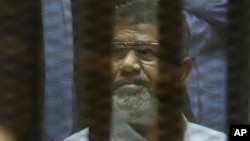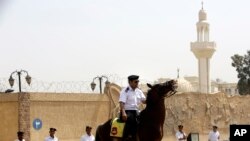An Egyptian court sentenced former President Mohamed Morsi to 20 years in prison Tuesday in connection with the killing of protesters in 2012. The sentence is the first of several to be handed down in cases pending against Morsi.
He escaped a possible death penalty with the court ruling that he and 12 other Muslim Brotherhood leaders and supporters were guilty of intimidation and violence, but not murder.
During the trial, the defendants, including top Muslim Brotherhood leaders Issam Elarian, Mohamed Baltagi and the group's Supreme Guide, Mohamed Badie, gave a symbolic four-fingered salute from behind the soundproof defendants' cage.
Brotherhood supporters use the salute to protest the bloody military operation to disperse the group's protest camp outside the Raba Adawiya mosque in the north of Cairo in August 2013. At least 600 people were killed before the operation was over.
The charges are related to clashes outside the presidential palace that started with Morsi's Islamist supporters attacking protesters who were rallying against a decree declaring his decisions could not be challenged by the courts.
Morsi, the country's first democratically elected president, came to power nearly four years ago promising a brighter future for Egypt after the popular uprising that ended the longtime rule of Hosni Mubarak.
But his policies brought on massive protests that led then-military chief Abdel-Fattah el-Sissi to oust him.
Crackdown
A military-led transition that ended with Sissi himself becoming president also included a crackdown on Morsi's Muslim Brotherhood.
The group was once banned under Mubarak, and after a resurgence under Morsi's rule, was declared a terrorist organization under the current government with most of its leaders arrested.
The Brotherhood has continued to insist that Morsi is Egypt's legitimate leader and that Sissi led a coup against him.
The group issued a statement ahead of Tuesday's verdict saying the president is "exploiting the judiciary as a weapon against popular will." It also called on Egyptians to launch new protests.
While awaiting the verdict, Osama Morsi told Reuters news service that his father is "a man with a mission. The mission is the path of democracy that we gained in the 25 January revolution.
"We will get it back. President Morsi knows this well," Osama Morsi continued, speaking about his father. "... Do not worry about Mohamed Morsi's spirit."
Osama Morsi, 31, is part of his father's defense team. He told Reuters in a phone interview Monday that the elder Morsi "is quite well, physically and spiritually."
He told Reuters he'd met with his father at least seven times since the elder man's detention, with all the meetings in a small, heavily guarded room off the court. No one in Morsi's family, including his other four children, has been allowed to visit him in prison, where he's kept in isolation.
'Travesty of justice'
Amnesty International described the ruling as "a travesty of
justice'' that "shatters any remaining illusion of independence and impartiality in Egypt's criminal justice system,'' reports Reuters.
The rights group called for Morsi to be retried in a civilian court "in line with international standards'' or released.
Supporters of Morsi burned tires in at least several locations in the capital, Cairo, Tuesday to protest the verdict. Muslim Brotherhood leaders outside Egypt condemned the verdict and urged supporters to show their displeasure with it.
Amr Darrag, a former minister in the Morsi government and leader of his Freedom and Justice Party, insisted in a statement that the former president was “a brave and honorable man and a committed democrat who was chosen by the people.”
Darrag also said that Tuesday's verdict was a “travesty of justice,” and that it was “scripted and controlled by the government.”
Veteran editor and publisher Hisham Kassem tells VOA that it is possible Egypt's judiciary had its own motives for wanting to punish Morsi and his associates.
"The Brotherhood were going to make an early retirement for one third of the judiciary in order to bring in their men and Islamize or Brotherhoodize the judiciary and the judiciary have taken offense over this. So, that it something I bear in mind," he said.
Morsi, Mubarak, same charges
Kassem went on to argue that Morsi and his Muslim Brotherhood associates, unlike former president Hosni Mubarak, who was tried on similar charges of brutality against protesters, may have done a bad job of covering their tracks.
“The difference between Mubarak and Morsi is Mubarak, as he was going under, knew he was going under and he is a rational man, whose judgments are earthly," he said. "The Brotherhood did not believe they were going under. They believed Divine intervention was going to take place and so they weren't covering their steps properly, as opposed to Mubarak, who left very little evidence of misdoings."
The verdicts against former president Morsi and his associates can still be appealed. Several cases, including breaking out of prison in 2011, collaborating with external enemies of Egypt, and handing state documents to Qatar, are still pending.





